#HIV Positive Partner
Explore tagged Tumblr posts
Text
𝐀 𝐏𝐥𝐚𝐭𝐞 𝐨𝐟 𝐋𝐨𝐯𝐞 | 𝐔𝐧𝐜𝐨𝐧𝐝𝐢𝐭𝐢𝐨𝐧𝐚𝐥 𝐋𝐨𝐯𝐞
#lgbtq#mother#unconditional love#lgbtq archives#christmas#holiday#christmas dinner#gay history#aids#hiv positive#aids stigma#loss of partner#mother and son#tribute to mom
6 notes
·
View notes
Text
HIV Marriages for HIV Positive Brides and Grooms in India
In a society where traditions and societal norms often dictate the path of matrimony, the challenges faced by HIV-positive brides and grooms in India, especially in Hyderabad, are distinctive and demanding. This article delves into the complexities surrounding HIV-positive marriages, shedding light on the need for support, understanding, and the creation of a more inclusive environment.
Brief Overview of HIV-Positive Marriages HIV-positive marriages involve couples where one or both partners are living with HIV. Despite medical advancements, societal stigmas continue to surround these unions.
Importance of Support for HIV-Positive Brides and Grooms The emotional and psychological toll on couples navigating HIV-positive marriages emphasizes the crucial need for support networks and understanding within their communities.
Context of HIV-Positive Marriages in India, Specifically Hyderabad India, with its rich cultural tapestry, faces unique challenges concerning HIV-positive marriages, and the city of Hyderabad is no exception.
Understanding the Challenges
Stigma Surrounding HIV-Positive Individuals One of the primary obstacles faced by HIV-positive brides and grooms is the pervasive stigma attached to their condition. Addressing this stigma is vital for fostering acceptance.
Lack of Awareness and Education A significant hurdle lies in the lack of awareness and education regarding HIV transmission, prevention, and the realities of living with the virus.
Emotional and Psychological Challenges Coping with the emotional and psychological challenges is a journey often traveled in isolation. Counseling services play a pivotal role in supporting these couples.
Navigating the Wedding Preparations
Support Networks for Couples Establishing robust support networks is essential for couples preparing for an HIV-positive marriage. Friends, family, and community organizations can offer invaluable assistance.
Counseling Services Professional counseling services provide a safe space for couples to address their concerns, fears, and aspirations, ensuring they embark on their marital journey with resilience.
Positive Examples and Success Stories Highlighting positive examples and success stories of HIV-positive marriages inspires hope and resilience within the community, dispelling myths and misconceptions.
Legal Aspects of HIV Marriages
Rights and Responsibilities Understanding the legal rights and responsibilities of HIV-positive brides and grooms is crucial for navigating societal expectations and safeguarding their union.
Legal Safeguards for HIV-Positive Brides and Grooms Legal frameworks exist to protect the rights of individuals with HIV. Awareness of these safeguards is vital for ensuring fair treatment.
Navigating Societal Norms and Expectations Balancing traditional expectations with the realities of HIV-positive marriages requires open dialogue and education to foster acceptance within communities.
Wedding Rituals and Traditions
Adapting Traditions for HIV-Positive Couples Customizing wedding rituals and traditions ensures that they align with the needs and comfort levels of HIV-positive couples.
Creating a Supportive Environment Fostering a supportive environment during wedding ceremonies helps create a positive and inclusive atmosphere for the couple and their guests.
Inclusivity in Wedding Ceremonies Promoting inclusivity in wedding ceremonies not only supports the couple but also contributes to changing societal perceptions surrounding HIV-positive marriages.
Community Involvement
Raising Awareness Community involvement is crucial for raising awareness about HIV, dispelling myths, and fostering an environment of empathy and understanding.
Building a Network of Support Communities can play a vital role in building a network of support, ensuring that HIV-positive couples have the backing they need to thrive in their marriages.
Encouraging Empathy and Understanding Creating spaces that encourage empathy and understanding reduces stigma and helps the community embrace the diversity of love.
Healthcare Support
Access to Medical Facilities Ensuring access to medical facilities and healthcare services is imperative for the well-being of HIV-positive brides and grooms.
Importance of Regular Check-Ups Regular health check-ups are vital for managing HIV. Encouraging couples to prioritize their health is essential for a fulfilling marital journey.
Dispelling Myths About HIV Transmission Education plays a crucial role in dispelling myths about HIV transmission, promoting a more informed and accepting society.
Financial Considerations
Challenges in Employment Opportunities HIV-positive individuals may face challenges in employment opportunities. Addressing these challenges through advocacy and support is essential.
Financial Planning for HIV-Positive Couples Financial planning becomes crucial for HIV-positive couples, considering potential challenges in the employment sector. Government and NGO support can play a vital role.
Government and NGO Support Governments and non-governmental organizations can contribute significantly by providing financial support and creating initiatives to empower HIV-positive couples.
Social Media and Advocacy
Utilizing Social Platforms for Awareness Leveraging social media platforms is a powerful way to raise awareness, educate the public, and advocate for the rights of HIV-positive couples.
Advocacy for HIV-Positive Marriages Advocacy efforts aim to break down societal barriers, challenge stigmas, and create a more inclusive society for HIV-positive couples.
Empowering Couples Through Online Communities Online communities provide a space for couples to share experiences.

#HIV Marriages#HIV Positive Marriages#HIV Partner#HIV Marriages near me#HIV Marriage Bureau Near me#HIV Marriage consultancy in Hyderabad#HIV Positive#HIV girl for marriage#HIV marriages in India#HIV positive matrimony#HIV Positive matrimonial#Hiv Positive life partner#HIV positive brides#Hiv positive Girls#HIV Positive Grooms#HIV positive marriage#matrimonial site for HIV positive#marriage bureau for HIV positive#HIV positive woman marriage#Hiv positive matchmaking#HIVpositivemarriage#HIV marriage bureau Bangalore#HIV marriage#HIV matrimony#Hiv positive Matrimonial India#HIV positive marriage bureau#Marriage of HIV Positive#HIV matrimonial#HIV positive marriage site#HIV Positive Datings
0 notes
Text
My dear lgbt+ kids,
For some people, just reading facts is less educational than actively engaging with them - so here’s a little pop quiz on HIV transmission!
I’ll tell you some scenarios and you can try to answer if you think you could get HIV that way or not. You’ll find the correct answers under the cut!
You go swimming with some friends. You later learn that one of them is HIV-positive. You were in the water at the same time.
You had sex without a condom. It was with your long-term partner and it’s a closed relationship (neither of you has sex with others). You both got tested early on in the relationship, both were negative, but it has been some years since then.
You got so drunk at a party that you don’t fully remember what happened. You believe you may have had sex with someone there but, for the life of you, you just can’t remember who it was or if you used protection.
You had to pee really really bad while out and about, so you ended up using a public restroom that was pretty gross and dirty.
You went on a couple dates with someone. You kissed a few times but didn’t go any further. They just contacted you and told you they tested positive for HIV.
You live with a roommate. They had some friends over and you just realized one of them apparently used some of the body lotion you were storing in the bathroom.
You had casual sex with someone. You used a condom but they later on told you that it slipped off during the act and that they didn’t say anything to not ruin the mood.
One of your friends is HIV-positive. You often hug them or you snuggle while watching tv together. Sometimes you even share a drink (from the same cup).
You used what you believed to be your own lip balm. You feel grossed out when you realize it’s not yours: your coworker accidentally put theirs in your coat pocket.
You are in a long term relationship and are regularly sexually active without a condom. You just learned your partner cheated on you multiple times.
Correct answers below the cut:
1.No risk. HIV cannot survive in water and is not transmitted through casual contact.
2.No risk (if everyone is honest). If neither of you has had any other partners since the tests, and you haven’t been exposed to HIV through other means, there’s no risk. (However, if there is any uncertainty (you worry they may lie about not sleeping with anyone else etc.), it’s a good idea to get retested!)
3. Potential risk. Unprotected sex can transmit HIV, so it’s recommended to get tested if you’re uncertain about protection use or the partner’s status.
4. No risk. HIV is not transmitted through surfaces, including toilets, regardless of cleanliness.
5. No (to extremely low) risk. HIV is not transmitted through saliva, so kissing does not pose a risk. (The only risk would be if both of you had sores or bleeding gums and blood from the HIV-positive partner gets into the bloodstream of the HIV-negative partner. This is extremely unlikely.)
6. No risk. HIV does not survive well outside the human body and is not transmitted through sharing personal care items like lotion.
7. Potential risk. If the condom slipped off, there may have been some exposure to bodily fluids, which could transmit HIV. Testing is advised. (Side note: Consent is only true consent if everyone is informed on what’s going on. In this scenario, you did not consent to having sex without a condom! Regardless of them not wanting to “ruin the mood”: That’s a form of sexual assault.)
8. No risk. HIV is not transmitted through casual skin contact like hugging or snuggling. HIV is also not spread through saliva (drinking from the same cup).
9. No risk. HIV cannot survive well outside the body and is not transmitted via shared lip balm.
10. Potential risk. If your partner has had other partners, there is a risk of exposure. Testing is recommended.
How many did you get right?
With all my love,
Your Tumblr Dad
#Let me know if you like this format and if so if you’d like a pop quiz on any other topic!#lgbt#lgbt+
269 notes
·
View notes
Text
HIV research and monitoring has historically excluded transgender men, creating blind spots in understanding this group’s sexual well-being and happiness. Two recent studies—one out of New York and the other from Germany—suggest that transgender men who have sex with other men have a higher prevalence of HIV than the general population. The German analysis further finds that transgender men who have sex with other men face a host of inequities compared to cisgender gay and bisexual men, including reduced access to sexual healthcare and less satisfying sex lives. [...] Almost three quarters of trans MSM reported their income was insufficient for them to live comfortably, compared to about half of cis MSM. The researchers note that the income disparity could be due to the trans MSM participants being younger on average, but they also suggest discrimination could play a role. In terms of mental health, survey scores indicated both groups experienced various degrees of depression and anxiety from mild to severe. However, trans MSM were almost four times as likely to suffer from severe anxiety and depression compared to cis MSM (15% vs 5%). Furthermore, trans MSM indicated far more suicidal ideation than their cisgender counterparts (41% versus 16%). The survey results also pointed to gaps in sexual satisfaction, with more trans MSM being unhappy with their sex life than cis MSM (34% versus 22%). Trans men more often disagreed that sex was as safe as they wanted (18% versus 11%) and indicated less ability to say no to unwanted sex (23% to 12%). Trans MSM reported fewer sexual partners than cis MSM, and the study authors propose that difficulties in finding partners due to stigma may contribute to less happiness in their sex lives. On the whole, trans MSM also had poorer access to healthcare compared to cis MSM. Fewer had ever received either an HIV test (41% versus 24%) or an STI test (55% versus 45%). Drawing on other research, the authors suggest that one reason for this may be discrimination in healthcare settings, which may cause trans men to avoid seeking sexual health services. The authors go on to say that stereotypes, such as assuming trans men only have sex with cisgender women, may also interfere with providing adequate care. Finally, although trans MSM had higher rates of HIV than the general population, this was lower than amongst cis MSM (2.5% versus 10.7%). A different study conducted in New York City by Dr Asa Radix and colleagues of the Callen-Lorde Community Health Center also found that HIV prevalence is higher in transgender men. In this retrospective analysis, the authors identified a racially diverse group of 577 transgender men who sought care at the facility between 2009 and 2010. Among this group of men (mean age 32 years), less than half (n=250) had ever had an HIV test. Out of the 250 individuals who had, 2.8% (n=7) tested positive for HIV, a significantly higher rate of HIV than the current US national prevalence of 0.41%. Of the 18 trans men who had sex exclusively with cis men and tested for HIV, two (11.1%) were positive.
604 notes
·
View notes
Note
hi sex witch! i have an sti testing question: i’ve heard both from your blog and other sources that getting tested 10-14 days after each new partner is a good rule of thumb, but i’ve also read stuff recommending that for HIV specifically, you should be getting tested every 3 months—is that true regardless of how many partners you have? i want to be responsibly slutty but i also don’t want to be wasting resources by getting a bunch of unnecessary HIV tests. (if relevant: i have a vagina, partners have a variety of genitals) thank you!
hi anon,
the frequency with which one should get tested for HIV depends largely on relevant risk factors and how likely one is to be exposed to HIV in the first place. generally, I've seen the 3 month recommendation used for cases such as people who are sharing needles or other forms of injection, people who have had sex with at least one HIV positive partner, and people who are having sex with multiple partners who have a high risk of HIV or whose status is unknown. while it always pays to be careful, if you're having sex with people who know that they are HIV negative or who have HIV but are undetectable and unable to transmit, you're at a much lower risk and less likely to need to regularly test for HIV.
the 3 month window is also relevant to HIV testing because HIV can take much longer than other STIs to show up positive on a test. the most common way to test for HIV, antibody tests, are generally considered to give the most accurate results when taken 3 months from the date of potential HIV exposure, although for some it may take longer to detect a positive result.
71 notes
·
View notes
Text
Finished Last Twilight, and I'm not adding to the ableism discourse, because most things have already been said and with a lot of beautiful nuance that I agree with. But I do want to talk about how that ending arrived because of Aof Noppharnach's consistent symbolic commentary on the experience of living with HIV in much of his work, with an approach that's unique among all queer content. Imma skip Gay OK Bangkok since its not even a metaphor there, but I'll explain my rationale for the others, and we can just appreciate the foundation Gay OK Bangkok lays for us to think about the rest of his stuff.
The motif of life-saving medical intervention comes up in all but one of the works he takes screenwriting credit on. He's Coming To Me: P'Med dies originally because of a lack of medical intervention. 1000 Stars: Tian gets a heart transplant. Moonlight Chicken: this one's more subtle, but the whole series is explicitly established in the context of reopening following the COVID pandemic, and Wen will later say to Jim, "we are survivors." It was this line upon rewatch that made me start considering how thorough this theme is. Survivors of what? The meaning is three-fold: hard lessons in love, COVID, and, for gay men of their age, the HIV epidemic. The hope of medical intervention for Day's condition takes on a secondary meaning, with this trend in mind, even if the mixed disability politics between visual impairment and being HIV positive really fails.
His comparisons are more intricate though. Pills and daily regimens are a consistent motif. Day has his daily eye-drops, Tian his pills (which are presumably immune-suppressants to help accept the transplant but I'm not going to Viki right now and watching every ep to find out so someone feel free to correct me). 'But people take medicine for lots of things,' you say. 'Just because its gay doesn't mean its an HIV metaphor!' You have a fair point! But here's where Aof gets real fun and sneaky. P'Med dies from lack of pills the same year Torfun, whose heart will save Tian's life, is born, 1997. I'm mentioned once before 1997 as important for the class-conscious Aof because of the Asian financial crisis that Thailand set off that year. However, 1997 is also important because its the year HAART, or Highly Active Anti-Retroviral Therapy was first used in Thailand (it had hit the market only one year earlier). HAART, a multi-drug regimen, boosted someone's life-expectancy with HIV up by 15 years, and its side-effects were significantly milder than previous approaches. The medical conditions of P'Med and Torfun's heart point us directly to HAART, and what it could offer.
Now we're moving out of the medical and into the experiential connections because, while Dark Blue Kiss is the only work Aof chose to take credit for screen-writing without incorporating medical references, it is by far the most dense with references to the issue of concealment. Its in the narrative as people closet identities and hide relationships, yes, but its in SO much of the visuals, too, most obviously the Pete & Kao mug hidden inside its coozie. It's easy to see the surface story about gay visibility and the closet, but there's a more specific subtext here about the associated condition that intensified the stigma of being gay and how that impacts your sense of self. Bad Buddy explores this issue less, but even in the BL Bubble, its haunted by the stigma of homophobia--it just shuffles it over onto rivalry so the audience can experience it without reproducing it.
However, the grief and shame of surviving when others haven't haunts Aof's other works much more intensely. Jim and Tian both are hung up on guilt for someone's death that they did not actually cause, continuing to pursue the goals for those that passed rather than their own. Then, there's Thun and P'Med, which is the best allegory for living and dating with HIV, bar none. It goes into the feelings of stigma and the limits of physical intimacy with partners that living with HIV caused, especially prior to Truvada's introduction in 2004. Even then, the show depicts how a HIV negative partner maintains the choice to participate in their own regimens, as Thun's desires for physical intimacy with P'Med manage their relationship and never the other way around.
This sense of required separation and gay identities that are less sex-focused also play into oft-maligned motifs in Aof's work. He's talked explicitly about people's criticisms of the limited physical intimacy in his earlier works that led to the more prominent stuff in Bad Buddy, but I hope given the above context, we can appreciate why physical intimacy is less of a priority than other kinds (and I'd add that 1000 Stars, which got the most sh*t about it, is actually one of the most erotically-charged BLs out there because of it's restraint). Then, you have the finales where characters separate for periods of time, and while I don't see this as explicitly tied to HIV experiences (Aof is literally following the book of romcom beats there, even if everyone whines about it), I can't help but appreciate a tangential connection to loving beyond time and distance that was required for those who lived with or lost loved ones to HIV.
I would've loved to see a version of Last Twilight that didn't absolutely bungle its metaphor, because it had every element to be something great (except, I'm sorry to the fans, lead actors with the necessary queer romantic chemistry). Watching the last episode, when the show seemed to finally rediscover plot and pacing, all the other pieces that had been drowned out by the disability conversation peeked their heads out, and I saw what the show wanted to be. The topics related to living with HIV of stigma, survivor's guilt, and assistive technologies: they were all right there, not just for Day but for everyone, if only they had been given the proper time to marinate to develop more complexity. It's the rare instance of a show where I'll choose to spend time imagining what could have been rather than obsessing over what was or just moving on. Even a misstep from Aof, like this, is overflowing with so many more layers than most series. The failures of Last Twilight, in relationship to his other works, even let you see how much food for thought he's providing.
#1000 stars#aof noppharnach#last twilight#he's coming to me meta#hctm#dark blue kiss#bad buddy#moonlight chicken#thank goodness we have heart from mlc where Aof doesn't try to fix him b/c deafness ESPECIALLY is a culture that's not tryna be 'saved'#also for anyone wondering i always say P'Med cuz I can't ever stop thinking of Ohm shouting it on the rooftop
80 notes
·
View notes
Text

MY FATHER'S ADVICE...
1. Not everything will go as you expect in your life. This is why you need to drop expectations and go with the flow.
2.Reduce bitterness from your life, that shit delays blessings!
3. Dating a supportive woman is everything.
4. If you want to be successful, you must respect one rule - Never lie to yourself.
5. If your parents always count on you, don't play the same game with those who count on their parents.
6. Chase goals, not people.
7. Your 20's are your selfish years, build yourself, choose yourself first at all cost.
8. Detachment is power. Release anything that doesn't bring you peace.
9. Only speak when your words are more beautiful than your silence.
10. Invest in your looks. Do it for no one else but yourself. When you look good, you feel good. Normalize dressing well, you're broke not mad.
11. Some people want to see everything go wrong for you because nothing is going right for them.
12. Being a good person doesn't get you loved. It gets you used.
13. Don't be afraid of losing people, be afraid of losing yourself by trying to please everyone around you.
14. Keep your move private. Don't announce it until it's SEALED! Premature announcements attract bad spirits. Best thing you can do is stop telling people what's going on in your life.
15. For the sake of your mental health don't love too hard, therapy sessions are expensive. Also, marry when you're ready, not when you're lonely.
16. Your thoughts are very powerful, make them positive.
17. Social media will make you envy someone you should actually pity.
18. Nobody owes you anything on your birthday, learn to save money and spoil yourself.
19. That move you're scared to make might just be the one that changes everything. Do it. Move.
20. Dont mess up your progress trying to rush the process.
21. No matter how thirsty you are, there are some people you should never ask for water.
22. Add value to your life, learn a skill, develop yourself.
23. Never love someone to the point where you no longer mind them hurting you.
24. You are your own best friend. Never ever, put yourself down.
25. Sometimes people come back in your life just to check if you're still stupid.
26. The sooner you figure out which chairs don't belong at your table, the more peaceful your meals become.
27. If you want to run, first you must learn to walk. Yes, the dreams are big, but you have to start somewhere, and doing something is better than nothing at all. Start small, stay consistent and watch it get bigger.
28. Before spending money on someone else, make sure your family is good.
29. What comes easy, won't last. What lasts, won't come easy.
30. Normalize lying to people who ask you lots of questions about your personal life.
31. One day you'll test HIV positive because of forgiving cheating partners.
32. Some Ex's need to understand that even if we hear they now drive a plane or own the world, we will never regret leaving them.
33. Avoid peer pressure.
34. Respect yourself.
35. Not everyone at your work place is your friend.
~ Do your job.
~ Get paid.
~ Go home
26 notes
·
View notes
Text
Stop calling left-wingers liberals
Liberals want equality of opportunity, not equality of outcome.
Providing free health-care to non citizens at the expense of citizens is not a liberal position.
Reducing intentional infecting with HIV from felony to misdemeanor and revoking the requirement to inform you partner about having HIV is not a liberal position.
Providing tax funded treatments that enable morbidly obese lifestyle is not a liberal position.
Abolishing prisons is not a liberal position.
Wanting the state to not police you too much is a liberal position.
Wanting the state to provide some safety net over the most basic needs is a liberal position.
But wanting the state to subsidize and shelter from the consequences of your every irresponsible behavior is not a liberal position.
It is not liberalism.
It should be called manchildinism.
81 notes
·
View notes
Note
Since you're sex positive, what's your take on guys with HIV (undetectable)? Would you have sex with them? Would you consider unprotected sex? Do you expect them to tell you about their status, or you're just assuming that there's always a chance that your sexual partner might be positive?
Yes, and I have in the past. And I think it's always good to assume some kind of risk for your own safety. It just keeps everyone healthier and safer. If you are comfortable with using protection and PrEP, it should be fine. Just be smart about these situations, and make sure your partner is being completely honest with you. I think you should always be transparent about any infection, whether it's HIV, the flu, COVID, gonorrhea... doesn't matter. You owe it to your partner to be transparent.
Don't lie to them just to get sex.
22 notes
·
View notes
Text
Matrimony for HIV-Positive Grooms and Brides in India
In a country where societal norms often shape the contours of relationships, the narrative around HIV marriages is undergoing a transformation. Across the vibrant landscapes of Mumbai, Delhi, Bangalore, and Kolkata, couples are not merely bound by love but are pioneers in rewriting the script of matrimony. In collaboration with letmemarry.com, these cities are witnessing a resurgence of hope, resilience, and the celebration of love that transcends the limitations imposed by HIV.
Mumbai: A Tapestry of Love and Resilience In the bustling city of dreams, Mumbai, HIV couples are weaving a tapestry of love and resilience. Letmemarry bureau, as a catalyst, plays a pivotal role in connecting souls. The city's cosmopolitan spirit embraces diversity, fostering an environment where couples facing the challenges of HIV can build a life together. From strolls along Marine Drive to the vibrant street food culture, Mumbai offers a canvas where love knows no boundaries.
Delhi: Embracing Love Amidst Traditions Delhi, the heart of the nation, is witnessing a harmonious blend of tradition and progressive values in HIV marriages. Letmemarry Bureau in Delhi is not just a platform; it's a bridge that connects hearts beyond the stigma of HIV. The city's rich history becomes a backdrop for couples as they navigate life together, overcoming societal norms and building a future steeped in understanding and mutual support.
Bangalore: Tech Hub and Hub of Love In the Silicon Valley of India, Bangalore, where innovation thrives, letmemarry.com is carving a niche for fostering meaningful connections among HIV couples. Beyond the tech corridors, couples explore the city's parks, cultural events, and eclectic cafes, forging bonds that withstand the challenges of societal misconceptions. Bangalore's progressive mindset provides a supportive ecosystem for couples in HIV marriages.
Kolkata: Artistic Expression of Love Kolkata, with its artistic soul, provides a unique backdrop for HIV couples to express their love. Letmemarry bureau in Kolkata actively engages with the artistic community, breaking down stereotypes. From the iconic Howrah Bridge to the serene boat rides on the Hooghly River, the city offers a poetic setting for couples to script their love story, free from the shackles of societal judgment.
Life Together: Triumphs and Challenges
Navigating life as an HIV couple in these cities comes with both triumphs and challenges. While the supportive ecosystem created by letmemarry.com fosters understanding and love, societal stigma remains a hurdle. The couples' resilience, mutual support, and the platform's commitment to inclusivity contribute to the triumphs over adversity.
Celebrating Everyday Moments
In the midst of societal challenges, HIV couples in these cities find joy in everyday moments. From sharing a cup of chai in Mumbai's local trains to exploring Delhi's historical landmarks hand in hand, from tech-inspired dates in Bangalore to artistic expressions of love in Kolkata's cultural festivals, every moment becomes a celebration of their unique journey together.
Summary:
Redefining Love, One City at a Time
In conclusion, the top four cities in India – Mumbai, Delhi, Bangalore, and Kolkata – are not just witnessing HIV marriages; they are witnessing a redefinition of love itself. With letmemarry.com as a guiding force, couples in these cities are navigating life together, breaking down societal barriers, and rewriting the narrative of matrimony in a way that celebrates love in its purest form.

#hiv positive marriages#hiv positive groom near me#hiv positive bride near me#HIV Marriages#HIV Positive Marriages#HIV Partner#HIV Marriages near me#HIV Marriage Bureau Near me#HIV Marriage consultancy in Hyderabad#HIV Positive#HIV girl for marriage#HIV marriages in India#HIV positive matrimony#HIV Positive matrimonial#Hiv Positive life partner#HIV positive brides#Hiv positive Girls#HIV Positive Grooms#HIV positive marriage#matrimonial site for HIV positive#marriage bureau for HIV positive#HIV positive woman marriage#Hiv positive matchmaking#HIVpositivemarriage#HIV marriage bureau Bangalore#HIV marriage#HIV matrimony#Hiv positive Matrimonial India#HIV positive marriage bureau#Marriage of HIV Positive
0 notes
Text
People talk about Rent having problems, I'm sure it does, but rewatching it as an adult who has gotten much, much more accepting of it's content, I think it was absolutely brilliant for it's time. I grew up in a very conservative home, Rent was my first positive exposure to most of the pairings and expressions of queerness contained within and the way it exposed me was so smart.
What's amazing to me is that we have an avatar for the audience in Mark Cohen (like he's literally behind the camera), but unlike other media where he might have taken the audience by the hand and introduced them to all these people who are so different from the norm, he accepts all of them as normal without explanation. He's living with someone who has AIDS, he's friends with a gay man who is dating a drag queen, and his ex-girlfriend is bisexual, he doesn't blink at any of it. He treats his ex-girlfriend's girlfriend like any other ex's new partner, which may not seem radical now but my only other exposure to this situation was Ross on Friends and let me tell you it was not handled well.
I found the same-sex pairings uncomfortable at the time, but the writers gave me a great heterosexual couple to root for and root for them I did, even though they were a current and a former drug addict, both HIV positive, one was a sex worker (and everyone is just accepting of her being a sex worker!) Again, I was brought up very conservative, identifying with that couple was entirely new to me. These were people who I was supposed to accuse of moral failings but instead I just wanted them to find happiness. That is an accomplishment!
Also, the songs are just one banger after another. Honestly.
#rent#personal?#personal#it tricked me into identifying with them all#it made me forget my prejudices#that's amazing#and now looking back it probably helped me get over a lot of them
78 notes
·
View notes
Text

Cuba: From the Code to Respect
By John Alex Fernández Leyva
From Ahora, newspaper of Cuba's Holguín province
Mariana, a 15-year-old transsexual teenager, dreamed of finishing high school and studying medicine. However, the management of her school refused to wear the female uniform, arguing that "it did not correspond to her documents" and because "her sex at birth dictated it".
This experience is especially relevant today, when the implementation of the new Family Code, a modern, inclusive and protective law seeks to guarantee dignity, equality and respect for diversity, defending fundamental rights so that stories like Mariana's are not repeated.
The National Center for Sex Education (Cenesex) since the approval of the Family Code by the Cuban people in 2022 has played a very important role in the dissemination and knowledge of the regulations by the population. Dr. Mariela Castro Espín, director of the institution, was part of the drafting committee and legal specialists participated with the contribution of ideas in the consultations.
Yuleiski Moré Arma, legal advisor of CENESEX commented: "We coordinate the legal guidance service that is intended for people who are victims of violations of their rights due to sexual orientation or gender identity, we also accompany women in situations of violence, as well as families of children and adolescents, who suffer child sexual abuse and other forms of mistreatment."
As a study and postgraduate institution of the University of Medical Sciences of Havana, the center has the mission of training human resources in relation to the issues of comprehensive sexuality education.
"A lot has been achieved but we are not satisfied, we know that we still have to continue working based on the education of the Cuban population in respect for the rights of others and inclusion, so that it does not remain only in the letter of the Code," said Moré Armas.
In Holguín, legal orientation services are provided for key population groups every Thursday from nine in the morning to twelve at noon from the Alex Urquiola Provincial Library. The space aims to eliminate discriminatory practices, balance social inequalities due to gender discordance, discrimination based on positive serological status or sexual preference, as well as abolish violence, especially in gender-based issues and situations that affect quality of life.
It also addresses the physical and emotional health situation of vulnerable populations in the national response to STIs, HIV and hepatitis, the project also directs attention to transgender people, men who have sex with individuals who practice transactional sex and their partners, in addition to those living with HIV.
Equal marriages in Holguín
Advances in the legislative system have allowed resolutions such as the one related to assisted human reproduction techniques. In addition, according to the Civil Status Registry department of the Provincial Directorate of Justice of Holguín, a total of 124 equal marriages are counted in the territory from 2023 to April of this year, from the implementation of the new Family Code.
Tania Pérez Torres, head of the Ombudsman's Office department Tania Pérez Torres, head of the Ombudsman's Office in the legal body, said: "The Ombudsman's Office, as a structure of the Ministry of Justice, has the mission of protecting, guaranteeing and restoring the exercise of the rights of children and adolescents, people with disabilities, the elderly, individuals declared judicially absent, citizens who are victims of discrimination and violence in any of its manifestations, among others.
"The City of Parks has an office located on Aguilera Street, on the corner of Cardet that provides advice and accompaniment to any person who is a victim of discrimination based on sexual orientation or gender identity due to stereotypes marked in society. When any person incurs in these acts, it is a legal matter, gender is a social construction that is configured in a socio-legal way."
Maribexy Calcerrada Gutiérrez, psychologist and professor at the University of Holguín, explained: "The sensitivity of protecting these citizens against rejection is a common purpose that leads to obviating differences, which due to various conditions, could not be so functional.
"For example, a person who identifies with a gender norm other than their genital sex has likely experienced contradictions, rejections, and those same experiences intervene in their personal well-being and the health of their interactions because, among other factors, a history of rejection can disrupt the healthy course of personality development."
To break down prejudices and move towards a fairer society, it is key to stimulate research that collects the experiences and life experiences of people with sexual diversity, only in this way can the real challenges they face be understood and dismantle stereotypes from a human, social and legal perspective.
"It is an issue on which we must take a humanitarian position, on the one hand, the value of the person above any conduct, on the other hand there is a lack of causal analysis, the defense of the dignity of these people as a common objective has contributed to globalizing the meaning of these behaviors as an expression of rights in equivalence with any other."
"What differs is the analysis of histories that are at the basis of many divergent orientations from the norm, which have not always been so functional. Without absolutizing, he identified homo people at the intersection with other sexual diversities, in which there was an absence of parents due to abandonment, deterioration of affectivity in the family origin, sexual violence. It is not necessarily in the causal basis of all subjects with these behaviors, but such histories exist in many cases. In order to position this issue only as a problem of law, a more psychological analysis has been omitted," Calcerrada Gutiérrez said.
The new Family Code in Cuba explicitly recognizes and protects the rights of LGBTIQ+ people, expanding the concept of family and prohibiting discrimination based on gender identity, but its true impact will only be achieved if society knows and values these stories, understanding that behind each right there are lives marked by struggle. the hope and desire to be happy like anyone else.
Teresa de Jesús Fernández González, national coordinator of the Lesbian and Bisexual Women's Network commented: "We develop training workshops so that the types of violence that exist and sometimes are reproduced unconsciously because they are naturalized, we are interested in lesbian women not reproducing negative patterns in their relationships."
"The group is characterized by creating educational and informative materials related to comprehensive sexuality education. We do awareness and activism work from the point of view of the needs to make society more inclusive.
"When the groups detect that there are lesbian women who have suffered work, school or social harassment, they report it and take the lawyers so that they can guide them with the legal service in the different provinces where they should go.
"For lesbian women, the Ministry of Public Health approved a resolution granting the right to access assisted human reproduction techniques. The fact that many have married legally protects them and the code is fundamental to have legal support, we have always said that it is not enough for a code to be approved and for there to be laws, we must continue working on education." Yuleiski Moré in relation to the legal assistance service assured: "We are willing for an institution or person to summon us to talk about these matters, specialists help the population to understand the things that may be a reason for doubt. To access the legal guidance service is not exclusive to the city of Havana, anyone in the country can call, in addition to Santiago de Cuba and Sancti Espíritus a parallel service is provided."
"The most recurrent violations of rights occur to trans people who still encounter a little resistance, mainly in educational institutions and some workplaces where on certain occasions it is not allowed to go according to the identity with which they perceive themselves, this attacks the effective exercise of rights, but generally, without being absolute, have been resolved."
"In other cases we rely on the Ombudsman's Office, which has a very close link with the activity we carry out. We have discovered that the problem of the violation of rights is not only due to discrimination, but also due to the lack of knowledge of the rights that individuals may have, as an institution we do not impose on anyone what the methods and styles of work are like, what we do is persuade, teach the rights that all people have."
Trans identities are very new for some parts, mainly for the east and center of the country, due to a strong attachment to customs. You can refer to this person with the name as socially he identifies, it is also allowed to dress according to the gender identity with which he perceives himself, regardless of whether in the registrations for formalities they have his legal name.
Family Code referendum results
"Anyone who feels that at any time their right may be violated because of sexual orientation, gender identity or being in a situation of violence can contact them through 7830 2932 or 7838 2528, for legal advice. Also electronically through email soj.cenesex.cu we will receive complaints and requests, analyze them as a team and indicate the methodology according to what the law establishes," says the legal advisor of Cenesex.
Article 42 of the Constitution of the Republic of Cuba prohibits all forms of discrimination and guarantees equality before the law, without distinction of any kind based on gender identity, sexual orientation or any other condition that violates human dignity.
In addition, Article 47 recognizes the right to the free development of personality, as well as to image and voice, essential pillars for each person to be able to express himself or herself freely and respectfully. Only in this way, by ensuring these rights in everyday life, will we be able to build a society where stories like Mariana's are a thing of the past and diversity is celebrated.
Translated by Walter Lippmann
English: https://groups.io/g/cubanews/topic/114045590 Spanish: https://www.ahora.cu/en/punto-de-mira/24103-del-codigo-al-respeto
#Cuba#ProtectTransKids#TransRightsAreHumanRights#Families Code#Holguín#LGBTQIA#socialism#solidarity#Cenesex
13 notes
·
View notes
Text
Love in the Big City Eps 5 & 6: That Apartment Was Too Small
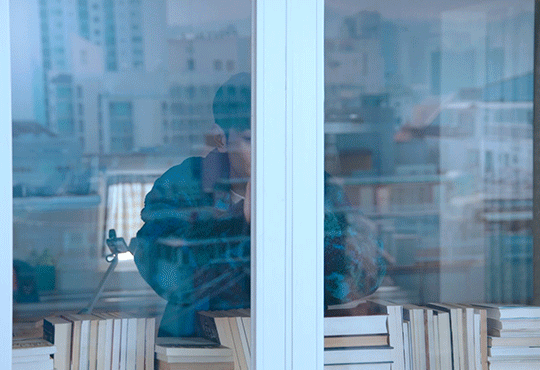
I’m late this week to write this post. Despite everything going on in the world and in my life, I have struggled with how similar episodes 5 and 6 played like Part 3 of the book. When I read over my reaction post for Part 3, I felt like I could post it with a few edits as a reaction to these two episodes. I’ve also read so many great posts about this section, so I’ll throw some quick thoughts down on some of the things that stood out in this section.
The T-aras Continue to Be a Great Change
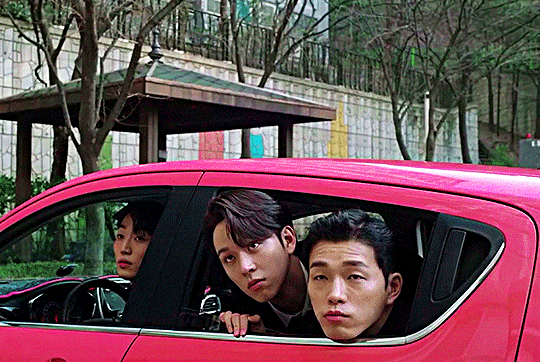
Presenting the drama in a more linear format required baton passes between the sections that the book didn’t require, and I really loved having the T-aras as pallbearers who also took care of Yeong when he wanted to go out the night of his mom’s funeral. I love how they also feel like they’ve matured as they’ve gotten older.

Making us love the T-aras so much makes their flippancy about being around someone they know, or suspect, is positive hit like a ton of bricks in the flashback. What’s so sad about this is it puts this wall up inside of Yeong that keeps him from ever telling them about his situation with Kylie. We know the T-aras love him dearly, and I think they would have adapted quickly to take care of their friend. I couldn’t help but think about the hospital scene from Part 2 and wonder how uncertainties Yeong felt about them complicated that moment for him.
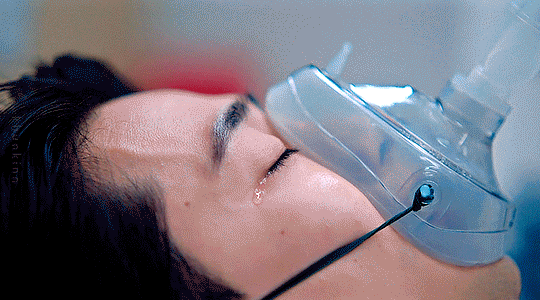
I also love that they’re the ones who got to meet and approve of Gyu-ho, and that they suggested Yeong take him on a trip to help rekindle the romance. Yeong not being completely alone has been one of my favorite changes, because few of us are ever as alone as we think we are.
Gyu-ho Feels so Alive
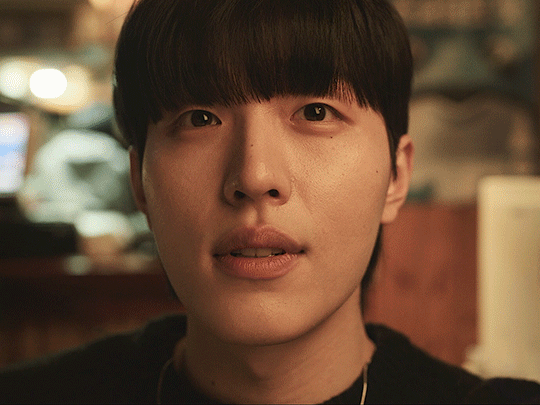
We see so much of Gyu-ho from Young’s perspective in the book, and I loved seeing him come alive and share space with Yeong in the drama. I loved seeing the mundanity of their relationship. I loved seeing Yeong consolidate and clean up the room to make it livable for Gyu-ho just as much as I loved seeing them struggle with their living habits. I loved seeing them fight over little things, and then seeing Gyu-ho adapt to that and cover annoyances (especially with the water bottles).
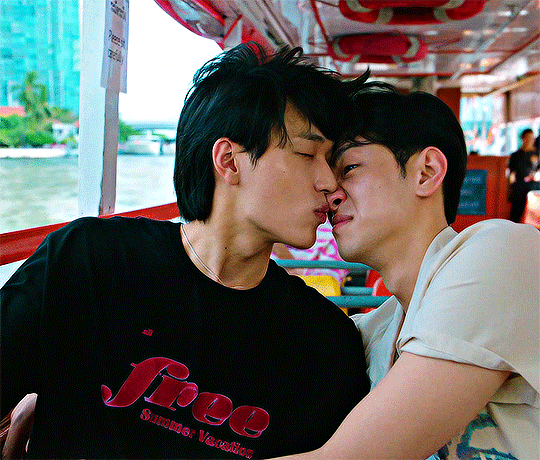
Unfortunately, Kylie ruins so much of Yeong’s ability to commit to this relationship, and I think it’s why staying in Mi Ae’s apartment might be one of my favorite choices of the drama. When we read Part 3, I kept thinking about how small Young’s apartment was, and how it didn’t seem right for the two of them to stay there. Here in the drama, we see that Yeong’s mom made sure to take care of her affairs, and I wondered at how much Yeong had stashed away from that, but also figured he wouldn’t want to stay in the home his mom had.
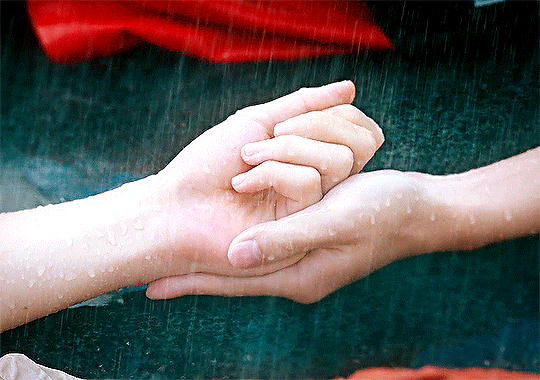
I think, for Yeong, Gyu-ho is just so radiant and beautiful a person that Yeong is worried he’ll infect with HIV and make “dirty.” He brings that word up a lot, and it made me so, so sad. Kylie is everywhere in their relationship. It’s in Yeong’s need to fake a blood test to get a decent job he hates. It’s in his inability to pursue work opportunities in other countries. It’s in their inability to have unprotected sex without worries. All of this culminates to make Yeong feel like he’s ruined Gyu-ho’s future for just being with him.
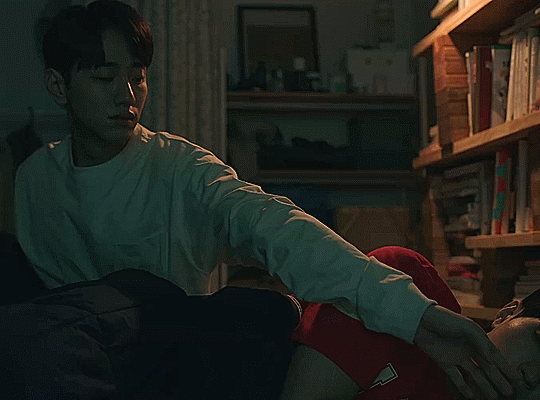
Conversely, it’s so frustrating to watch Gyu-ho from this perspective doing everything he can to make Yeong feel loved and valued. I felt so much for Gyu-ho when he got a solid job as a nurse and wanted them to get a bigger place together. I also felt for Gyu-ho searching for potential new partners on the apps. It sucked in the book and it sucks here when Yeong tries to shove Gyu-ho to go have sex with someone else when that’s not what Gyu-ho wants at all; he’s a romantic.
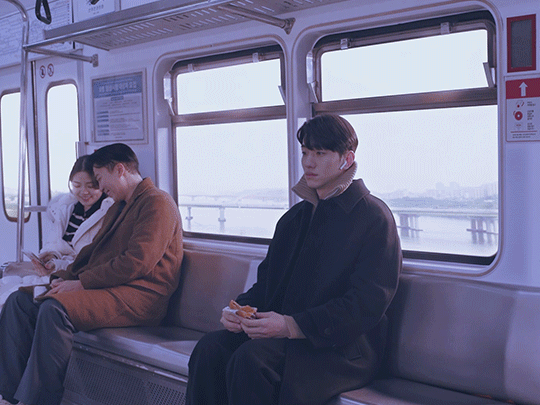
As such, they could not make this relationship work. Gyu-ho is probably the one person in the series we’ve seen Yeong trust to the most. The T-aras prickled his shame. Mi Ae outed him. Yeong Su turned out to be gross. Nam Gyu died. I believe Yeong when he said he was writing as hard as he could to build a future where he was independently wealthy enough to take care of himself and Gyu-ho, and it was so sad to see him completely lose the love he found in the present for that.
Onto the Finale
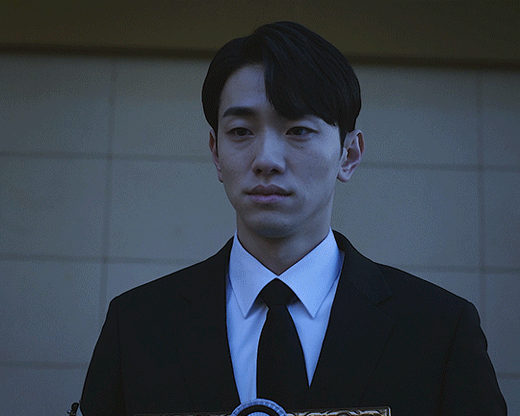
That’s all I’ve got this week. I find myself looking forward to this section because I’m so excited to see what Habibi turns into with this version. I’ve meditated on the fallout of the Gyu-ho breakup, and I’m excited to see what the drama does with that.
52 notes
·
View notes
Text
Hey content creators!!!
If anyone is doing content that involves fluid transfer, especially with non-exclusive partners, you need to know about this!
PASS has confirmed a positive HIV test at a shoot. Obviously, they have not confirmed who publicly, but known exposures are being contacted to retest and report.
If you have done any fluid transfer content, they are asking all performers (even indie content creators) to halt production until they can confirm containment.
PASS knows that not everyone can just stop working, so if you need to continue, minimize or eliminate fluid transfer during production, and absolutely use condoms or other barrier methods.
Keep an eye on AVN and PASS for updates!
14 notes
·
View notes
Text

And the Band Played On: Politics, People, and the AIDS Epidemic by Randy Shilts is heartbreaking, frustrating, and just plain high-quality nonfiction. From its early days as a mysterious form of ‘cancer’ to it finally being addressed as a public health disaster, Shilts tracks the story of AIDS and the incredible failure of the U.S. and state governments to respond to it appropriately, writing how bureaucracy, scientific competition, homophobia, sidelining of ‘anecdotal’ data in research, and failure of the media to investigate and ask questions, all came together to create an epidemic of a disease that was already a nasty killer, but that was allowed to run free thanks to a lack of funding and attention.
Where can I even begin? I grew up more aware than most kids about HIV and AIDS. My parents had participated in advocacy around the disease, and my uncle was HIV positive. But this book laid it all out, and shocked and hurt and twisted me through its pages. It outlined the story of AIDS in vivid, rich color. Shilts’s skill with foreshadowing is indicting on so many levels—the cowardice of too many people, the failure in vision. It at times reads like a political tragedy. At other times, it reads like pure, utter plague horror, suspenseful and so frustrating I had to put it down and take a walk or rant to my partner several times. Gaslighting, bureaucratic battles, mind-numbingly ridiculous hold-ups, mistakes, cover-ups, silences.
There is a lot of resonance with Covid. The desire not to ‘panic’ people, or to enforce normality, and how that allows disease to run rampant. Avoidance of harm reduction due to ‘civil rights’ arguments that too often turn out to be people wanting to continue to make money. People acting with utter denial, insisting they can’t spread it, saying they’re tired of being weighed down by warnings and fear. To how much of a role the media plays, and how necessary it is for reporters to question, follow leads, and ask tough questions to hold governments and institutions accountable.
But also hopeful notes. Out of the failure of just about everyone to help, a gay community was formed, a new one, rooted in harm reduction, safe sex, and social services run by and for queer people. I see clean air groups, mutual aid accounts, rising out of the ashes of the neglect and hate around us now. Shilts also highlights the heroes of the pandemic. Spoiler alert: they aren’t people who accepted easy answers or easy paths. They went rogue, leaked documents, went on the record when they weren’t supposed to, went around their universities’ backs for funds, forced funding through the back channels of Congress, heckled, demanded, threatened, and raged. It was a hopeful and bittersweet reminder that we will get nowhere by telling our friends what’s wrong, or journaling it after a day of minding your own business. Our heroes will be the non-compliant, and every hero will have a group of community members at their back.
Content warnings for suicide, suicidal ideation, medical trauma/dismissal, death/grief, homophobia.
#and the band played on#randy shilts#aids crisis#nonfiction books#nonfiction recommendation#my book reviews
22 notes
·
View notes
Note
Hello! You have opened a fascinating door into kink communities I didn't even know existed. Thanks for that. I was describing some of your steamworks adventures to my partner, who works as a Disease Intervention Specialist (aka DIS, a government healthcare worker who administers free/low-cost STD testing and then attempts to track down and notify+test the recent sexual partners of any infected individuals). (He brings some INSANE stories home from work and gets to give sex ed talks at the local Christian college using a model penis that actually ejaculates--but I digress.) He was horrified by the hypothetical situation where an infected person could have blindfolded sex with an unknown number of nameless strangers. It's hard enough trying to track down partners when the patient only knew them by their Grindr username. How do you have safe sex in these situations? Some STDs can be transmitted via skin-to-skin contact even with a condom. Do venues like steamworks enforce any rules around testing/protection/etc.?
If your partner is 'horrified' by the actual sex lives of the populations he ostensibly serves I think he needs to read more from harm reductionist thinkers and queer activists from a variety of past eras and work on processing his feelings of judgement to ensure it doesn't impact his actions in that line of work.
The books and Melancholia and Moralism, Saving Our Own Lives, and Beyond Shame: Reclaiming the Abandoned History of Radical Gay Sexuality are good places to start.
If you're having anonymous or blindfolded sex in cruising spaces, one route of managing risks is to assume that every person there could be infected with STIs you do not have and to plan accordingly. Vaccines, condoms, PreP, testing, and education are just some of the tools at one's disposal, and one should always be cognizant of the risks that one is consenting to. Steamworks has sexual health educators and testers present within their space regularly, but they don't gatekeep based on serostatus, health status, drug regimen or use of protection -- doing so wouldn't be feasible and would be problematic on multiple grounds.
I don't believe the goal of a public health initiative or a life well lived is to eliminate all risk, or to regard the presence of any infection in any human body as unacceptable, but rather to empower people to make informed decisions about the level of risk they are comfortable confronting, or that is worth the numerous benefits to them.
Personally, I was in far greater danger when I didn't have access to such spaces. Cruising spaces make negotiating sexual consent far safer than privately dating and hooking up with someone, and Steamworks are vitally important queer community spaces, and for me are well worth the trade off. No one should have any illusions about this ever being an experience that they can eliminate all risk from, rather they should anticipate it and plan for it.
I think "safe sex" is an unhelpful framework to pursue because it is so binary and can't ever be guaranteed. What does safety mean? Which types of exposures do we consider to be "unsafe"? Am I unsafe if I encounter another person who, like me, has had a cold sore before, like 80% of the population? Or someone who has a strain of HPV I am vaccinated against? What about if I have an encounter with somebody with a cold? I'm "safer" being fucked by an HIV positive person who is undetectable and wearing a condom than I am having barrier free sex with a long term partner who cheats. I can't even know I'm taking a risk in the latter case; at Steamworks, I'm assuming my risk level to be on the high end and planning accordingly.
I understand that testing and tracing are important parts of public health for our populations. It was vitally important when monkeypox broke out. Maybe Steamworks should collect member emails and alert them if there was a reported transmission on a night that they visited. Though even then, there are some negative public health implications to dozens of people panicking. But there is no means of eliminating all risk entirely or tracing all human sexual behavior and I would be myself pretty horrified if there was.
276 notes
·
View notes